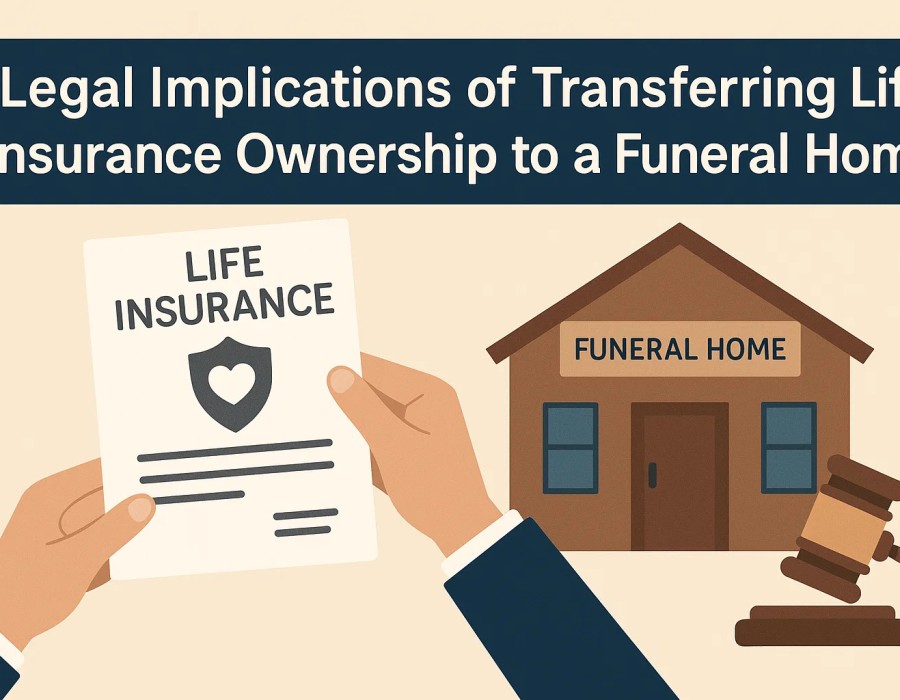When planning for end-of-life expenses, some individuals consider transferring ownership of a life insurance policy to a funeral home. While this can simplify the payment process and relieve family members from financial stress, it also carries specific legal implications that must be understood. This blog explores the legal side of transferring a life insurance policy, how the process works, and what you should know before making that decision.
What Does It Mean to Transfer Ownership of a Life Insurance Policy to a Funeral Home?
Transferring ownership of a life insurance policy involves changing the legal owner of the policy from the original policyholder to another party—such as a funeral home. Once ownership is transferred, the new owner gains full control over the policy. This includes the right to make changes to the beneficiaries, receive payouts, and determine how the funds will be used.
This strategy is commonly used in pre-need funeral planning, where the insured wants to ensure their funeral expenses are covered without placing a financial burden on their family.
Legal Requirements for Ownership Transfer
Before initiating a transfer of ownership, it’s essential to understand the legal steps and documentation involved. Insurance companies require:
- A signed ownership transfer form
- Identification of both the current and new owners
- Consent from the insured (if they are not the owner)
- A change in beneficiary designation, if applicable
The transfer must be voluntary and documented properly to be legally binding. If done incorrectly, the intended funeral home may not receive the funds, or the policy may be contested by other potential beneficiaries.
Key Legal Implications to Consider
Loss of Control Over the Policy
Once you transfer ownership, you relinquish all control over the policy. The funeral home can make changes, including cancelling the policy, changing beneficiaries, or cashing out its value.
This makes it critical to work only with reputable, licensed funeral homes and ensure all agreements are in writing.
Irrevocable Assignment vs. Ownership Transfer
There’s a legal difference between assigning benefits and transferring ownership. With an irrevocable assignment, you allow the funeral home to claim a portion of the death benefit to cover funeral costs, but you retain ownership of the policy. This method offers protection while still ensuring funeral expenses are covered.
In contrast, ownership transfer gives full rights to the funeral home, leaving no control in the hands of the insured or their family. Consult a legal or financial advisor before deciding which method best suits your situation.
Impact on Medicaid Eligibility
In some cases, transferring ownership of a life insurance policy can be a strategic move for Medicaid planning. Medicaid has strict asset and income limits, and a life insurance policy with a cash value may count against those limits.
By transferring the policy to a funeral home or using an irrevocable funeral trust, the value of the policy may be excluded from Medicaid’s asset calculations. However, rules vary by state, and any transfers made within five years of applying for Medicaid could trigger a penalty period. Always consult with an elder law attorney before making such transfers for Medicaid purposes.
Tax Implications
Transferring ownership of a life insurance policy may have tax consequences. While life insurance benefits are generally not taxable, gifting a policy could be considered a transfer of value and subject to gift tax rules.
The IRS may view this as a taxable event depending on the value of the policy and the relationship between the insured and the new owner. It’s advisable to speak with a tax advisor or estate planner before initiating a transfer.
Alternatives to Ownership Transfer
If you're hesitant about transferring full ownership of your policy to a funeral home, consider these alternatives:
- Funeral Assignment: This allows the funeral home to directly claim the portion of the death benefit required to pay for services, without transferring ownership.
- Pre-Need Insurance Policy: These policies are specifically designed to pay for funeral expenses and are often sold by funeral homes in partnership with insurance companies.
- Irrevocable Funeral Trust (IFT): This is a legal arrangement that sets aside funds for funeral costs and can protect those funds from creditors or Medicaid asset limits.
Best Practices When Considering a Transfer
- Consult with Legal and Financial Professionals: A lawyer or financial advisor can guide you on the legal risks and help you understand the contract details.
- Work with Licensed Funeral Homes: Only reputable providers should be trusted with ownership rights of your policy.
- Read the Fine Print: Before signing any documents, review all terms and conditions carefully.
- Inform Your Beneficiaries: Make sure your loved ones are aware of the arrangement to avoid disputes or confusion after your passing.
Final Thoughts
While transferring ownership of a life insurance policy to a funeral home can ensure funeral expenses are covered without delay, it comes with serious legal considerations. From loss of control to potential tax and Medicaid impacts, understanding the full scope of this decision is essential.
If you’re exploring this option, it’s always best to consider alternatives such as funeral assignments or irrevocable trusts. Protecting your family financially and legally is the ultimate goal, and careful planning can help you do just that.
FAQs
Can I transfer my life insurance policy to any funeral home?
Yes, but it's essential to choose a licensed and reputable funeral home. Once ownership is transferred, the funeral home gains complete control over the policy.
Is it better to assign benefits or transfer ownership?
In most cases, assigning benefits (via irrevocable assignment) is safer than transferring ownership. It ensures funeral costs are covered while keeping policy control in the insured’s hands.
Does transferring my policy affect my Medicaid eligibility?
It can. Transferring ownership may remove the policy from your countable assets, helping with Medicaid eligibility. However, improper timing or documentation can result in penalties. Consult with a Medicaid planning expert first.





Comments